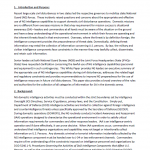
Recent large-scale civil disturbances in two states led the respective governors to mobilize state National Guard (NG) forces. These incidents raised questions and concerns about the appropriate and effective use of NG intelligence capabilities to support domestic civil disturbance operations. Domestic missions are no different from overseas missions in that a key requirement for mission success is situational awareness (SA)—leaders and commanders at all levels must be aware of the situation on the ground and have a deep understanding of the operational environment in which their forces are operating and the inherent threats faced in that environment. Overseas, where the threat is by definition foreign, the intelligence component provides the preponderance of threat data. Domestically, defining threat information may entail the collection of information concerning U.S. persons. By law, the military and civilian intelligence components face constraints in the manner they may lawfully collect, disseminate, and retain such information.
